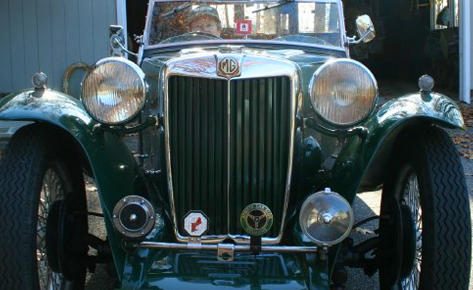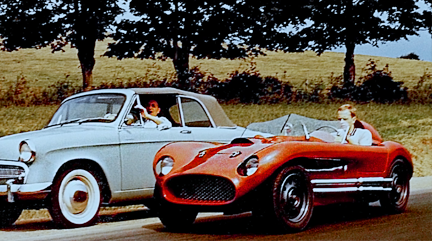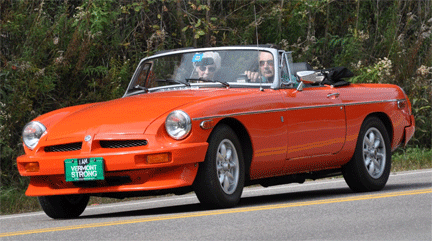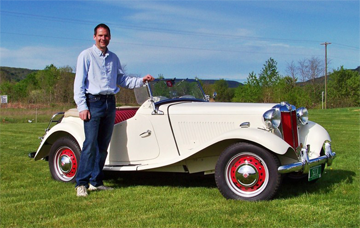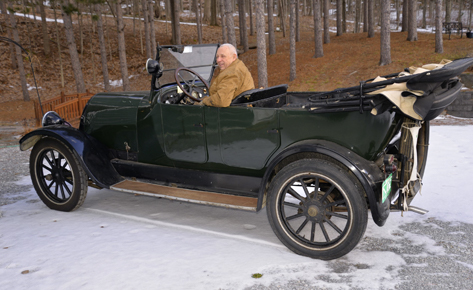Hi Dave. I have a question that may be good for Wheel Tracks as well. Battery life. Since we all have old cars that are not used too much–or not enough is a better description. I am now in a position that 6 car battery’s are over 8 years old. Some still working and others don’t have enough power to crank the starter. That can be a size-able expense that will face me again in about 5 years assuming that is the life expectancy. What options are there for Battery’s besides going new?
There are two real options for buying new. Conventional “wet” batteries, and newer, spiral glass mat gel cell batteries, like the “Optima” battery. If properly maintained, batteries can go strong for eight years or more, while a service life of 3-5 years is more typical. The biggest issues with the conventional “wet” batteries are:
- They leak. Battery acid is nasty, and can do considerable damage to the body of the car it is in. Leaking near the terminals can also cause considerable corrosion at the terminals.
- Conventional batteries lose energy, about 1% a day. This is made worse if it is a parasitic drain on an installed battery, like radio memory for example.
- Conventional batteries do not do well in hot environments, the water in the acid solution will evaporate. Heat is one of the biggest killers of “wet” batteries. It is often said that batteries are fatally damaged in the summer, then fail when the weather gets cold in the fall.
- Conventional batteries discharge explosive hydrogen gas, presenting the possibility of an explosion given the right situation.
- Conventional batteries must be mounted rigidly, right side up. They can not be tipped or subjected to severe vibration or jarring im-pacts. If tipped, they will leak. If shaken, they will fail structurally inside and could potentially short out. If loose, in addition to being unsafe, they will jounce about causing failure internally.
- If not properly charged, conventional batteries will freeze, and be destroyed. A charged battery has a freeze point of -95’F. A discharged battery will freeze at 20’F.
The other option is a glass mat spiral gel cell battery, like the Johnson Controls “Optima” battery. These batteries are significantly more expensive, about $50 more.
Gel cell batteries do not leak. Because they do not have the acid bath construction, they can be mounted in any position, even up-side-down. There is no concern about leaking acid or corrosion on the battery terminals. These batteries also do not discharge hydrogen gas, so there is no issue with venting them. Because there is no issue with evaporation of the electrolyte, they hold up better in very hot environments.
Because of the spiral, fiberglass mat gel cell construction, these batteries hold up very well to vibration and jarring impacts.
AGM batteries discharge at a much lower rate than conventional “wet” batteries. This can be a big plus for a vehicle that spends a considerable amount of time in storage.
The down side of AGM batteries is they are considerably more expensive, and there reliability is spotty. I have had three fail in less than two years. The warranty of the Optima is only a two year replacement warranty, kind of skimpy given the high purchase price in my opinion.
How can they be stored over the winter to maximize life?
Conventional “wet” batteries do well with a battery tender hooked up to them. Battery tenders charge the battery, then provide a “float” charge to maintain a full charge. They will not overcharge the battery. When the vehicle is returned to service, simply unplug the battery tender, and you are good to go. AGM batteries can simply be unhooked and left in the vehicle, they will not discharge.
Do battery’s like “Optima’s” last any longer in rarely used vehicles?
In theory, yes. In reality, that depends. I have had three Optima batteries fail in under two years.
Also, when I check my acid, I am finding particles in the fluid. Is that a sign that the plates are going bad? It actually looks dirty. I’d also guess you’d tell me to wait until spring to buy one. Otherwise it will sit on the shelf for 5 months.
When you check the acid, it should be clear. If it isn’t, there are impurities in it. This could be caused by sulfate on the lead plates, or impurities suspended in the acid. Either way, the battery is no longer good. If the plates are sulfating, the battery will not provide the proper amperage. If there are impurities in the electrolyte, the battery could short internally.
Proper maintenance of the battery includes checking the level of the acid in the individual cells. Only add distiller water. There is a myth that you should add acid. The level drops when the water in the solution evaporates. If you replace the water, you are keeping the concentration correct. The plates should remain under the surface of the acid.
I have learned that buying a new battery that may be “special” and some are, does not mean your getting a fresh battery. It may well have been left on the shelf waiting for me.”
The first thing you should check when purchasing a battery is the manufacture date on the battery. It will give the month and the year of manufacture. The battery should only be a month or two old. Any older, and I would ask for a newer one.
I always load check a battery to check it. I have a carbon pile load tester. It will put a load on the battery, and maintain the load for about ten seconds. There is both an amperage and a voltage gauge on the meter. If either the amperage of the voltage falls during the load test, an alarm sounds, and the needles on the gauges sweep down. If the battery is good, the needles on the gauges hold. Snap-on sells such a tester for about $600. I got mine at Harbor Freight for $50. I’m sure the Snap-on is a much better unit, but mine has worked fine for many years and I have no complaints. The Harbor Freight unit is well made and has good reviews.
 Please email all inquiries to: Dave
Please email all inquiries to: Dave
or snail mail
32 Turkey Hill Road
Richmond VT 05477


